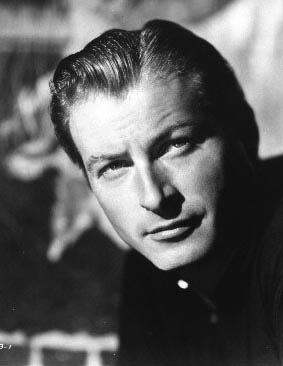Lex Barker (Lex Barker)

Lex Barker made it to Broadway once, in a small role in a short run of Shakespeare’s The Merry Wives of Windsor in 1938. He also had a small role in Orson Welles’s disastrous Five Kings, which met with so many problems in Boston and Philadelphia that it never made it into New York. In February 1941, ten months before the attack on Pearl Harbor, Barker left his fledgling acting career and enlisted in the US Army. He rose to the rank of major during the war. He was wounded in action (in the head and leg) fighting in Sicily. Back in the USA, he recuperated at an Arkansas military hospital, then upon his discharge from service, traveled to Los Angeles. Within a short time, he landed a small role in his first film, Doll Face (1945). A string of small roles followed, the best of which was as Emmett Dalton in the Western Return of the Bad Men (1948). Barker soon found the role that would bring him fame. In Tarzan’s Magic Fountain (1949), Barker became the tenth official Tarzan of the movies. His blond, handsome, and intelligent appearance, as well as his athletic, now 6’4″ frame, helped make him popular in the role Johnny Weissmuller had made his own for sixteen years. Barker made only five Tarzan films, but he remains one of the actors best known for the role. In 1957, as he found it harder to find work in American films, Barker moved to Europe (he spoke French, Italian, Spanish, and some German), where he found popularity and starred in over forty European films, including two movies based on the novels by Italian author Emilio Salgari (1862–1911). In Italy, he also had a short but compelling role as Anita Ekberg’s fiancé in Federico Fellini’s La Dolce Vita (1960).
In Germany, Lex Barker had his greatest success. There he starred in two movies based on the “Doctor Mabuse” stories (formerly filmed by Fritz Lang), in the movies Frauenarzt Dr. Sibelius (de) and Frühstück im Doppelbett, and in 12 movies based on novels by German author Karl May (1842–1912), playing such well-known May characters as Old Shatterhand (7 movies), Kara Ben Nemsi (3 movies), and Dr. Karl Sternau (2 movies). In 1966, Barker was awarded the “Bambi Award” as “Best Foreign Actor” in Germany, where he was a major, very popular, star. He even recorded two songs in German: “Ich bin morgen auf dem Weg zu dir” (“I’ll be on the way to you tomorrow”, composed by Martin Böttcher, the composer of some of the soundtracks of the Karl May movies) and “Mädchen in Samt und Seide” (“Girl in Silk and Velvet”, composed by Werner Scharfenberger). He returned to the United States occasionally and made a handful of guest appearances on American television episodes. But Europe, and especially Germany, was his professional home for the remainder of his life. Lex Barker died three days after his 54th birthday, in 1973, of a heart attack while walking down a street in New York City on his way to meet his fiancée, actress Karen Kondazian. The funeral was in New York. He was cremated and the ashes were taken by his last wife to Spain.
Born
- May, 08, 1919
- USA
- Rye, New York
Died
- May, 05, 1973
- USA
- New York, New York
Cause of Death
- heart attack
Other
- Cremated



